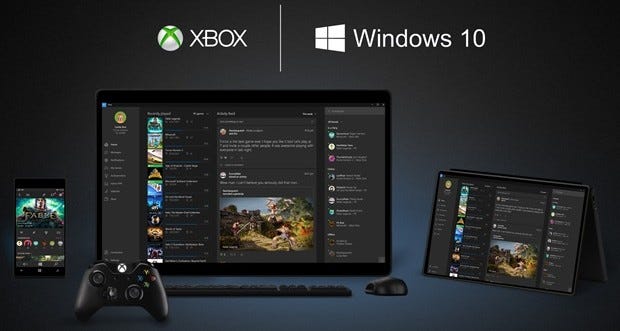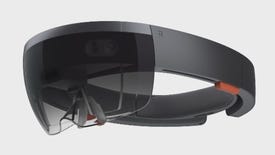Is Windows 10 Good For PC Gamers Or XBone Owners?
XBox Gaming Since 1873
"It's time for us to talk about gaming in Windows," promised Head of Xbox Phil Spencer in December. A little over a month later, Microsoft has finally stepped up to the plate with a slew of big announcements about Windows 10, Xbox and PC gaming delivered at its Redmond campus yesterday morning.
The big news for gamers—aside from holograms—is that Windows 10 will not only support multiplayer gaming between Xbox One and PC, but allow you to stream Xbox One games locally to PCs or tablets.
Which is all well and good for Xbox fans, but where does that leave PC gamers, especially ones who don't particularly care about Xbox?
"It's a good question," said Spencer. "I didn't want to make today's presentation all about 'Hey Xbox One owners, aren't you glad Windows 10 exists!' The first thing I was trying to do is just look at some of the social capability we've created on console and bring it in a self-contained way to Windows. So any of the things we talked about around Xbox Live on Windows don't require Xbox One at all."
Those features include a new game DVR that will allow users to record, edit and share game footage with friends, as well as the option to retroactively capture the last 30 seconds of gameplay. The Xbox app will be built into Windows 10—by default, it'll be in the start menu—and allow players to access their Xbox Live messages, friends lists and activity feed on any device running the new OS; you can even receive notifications. "Gaming has become a much more social activity," said Spencer during the announcement.
Of course, while some players will rejoice at this sort of integration, others remain skeptical. After the presentation, a reporter asked Spencer whether Xbox gaming and PC gaming can really coexist—and whether Microsoft has an incentive to push Xbox games over PC games,
"I think that's a fair perception," said Spencer. "But success of Windows 10 is critically important to this company and gaming will be a very important part of success for Windows 10. I love the Xbox business that we run; I love the console. But if you look at the scale inside of Microsoft of the Xbox One console [versus] Windows, I don't think anybody would think the console somehow outweighs what we do there… I look at the opportunity to make Windows gaming and Xbox gaming symbiotic with one another and try to grow the number of people who are connected and the amount of content that's available on both platforms… and I think we'll be able to thread the needle and do both."
The first question from many players—especially gamers nonplussed at the idea of streaming from lower-end hardware to a high-end PC—is whether Microsoft plans to support streaming in the opposite direction, from PC to Xbox. Spencer says it's "something that we're really looking at. If you think about [our] vision, that my games are my games wherever I am and I can play with whoever I want to play with—we'll want to have solutions."
The much-ballyhooed corporate synergy may also mean that more will be released on PC as well. During the event, Spencer announced that the previously Xbox-exclusive game Fables Legends would offer cross-play on PC and Xbox One and be released simultaneously on both platforms. "[Fable Legends] is just the first of our first-party games that will be coming to Windows 10, and we'll have more to announce," said Spencer.
One sticking point, however, may be the peripherals necessary for streaming. When Xbox games are played on PC, players will need to use a controller rather than a keyboard and mouse. Spencer says he knows that some players might not be thrilled at the idea of wiring a controller to their PC, but "there are technologies out there that will allow us to wirelessly bind a controller to a PC, and we will get there."
Mike Ybarra, Partner Director of Program Management, said they're aiming for streaming to run at 1080p and 60 fps—it's currently running at 720p and 30 fps in testing labs—but warns that your mileage may vary depending on bandwidth speeds. "Certainly our goal is to be as low-latency as possible, especially for frames per second," said Ybarra. "It'll largely depend on the scenario in which someone's trying to play it."
Microsoft also revealed more details about the long-awaited DirectX 12, which will ship with Windows 10. It's been over five years since DirectX 11 came out, a development gap that has allowed competitors AMD to step in with Mantle, an API that offered game developers much more direct control and better support for multiple cores. DirectX 12 aims to do the same, offering up to 50 percent better performance. Spencer also announced that Unity has adopted DirectX 12, joining Unreal Engine 4, and that DirectX 12 will cut the power consumption of DirectX 11 in half, making it easier for mobile devices to run high-end games.
There is one downside, however: DirectX 12 won't be compatible with earlier versions of Windows, and if you want to enjoy everything it has to offer, you'll need to upgrade to a new graphics card. "There will be DX 11.1 cards that take advantage of a lot of the driver and software tech that we're bringing in Windows 10, but if you want the full benefits of DX 12, you're going to need a DX 12 card," said Ybarra.
But hey, at least Windows 10 is free?
Windows 10 Is Free
Microsoft has a lot riding on Windows 10 after the lackluster response to Windows 8, and it's making a big and persuasive push for both Windows 7 and Windows 8 users to rally towards the Windows 10 banner. Not only are they integrating features that try to offer the best of both worlds—like a resurrected start menu that can appear as either a single column or full-screen—but they're offering free upgrades to Windows 10 for both Windows 7 and 8 users for a full year after its release.
Windows 10 has a few other tricks up their sleeves as well: all windows apps will be universal across PC, mobile devices, and Xbox One; Microsoft's personal digital assistant, Cortana, will be built into Windows search; and Microsoft Office will be bundled with the new OS for phones and tablets. Also, continuing their tradition of naming software after Halo references, Microsoft announced a new browser called Project Spartan, whose features include Cortana integration, making notes directly on webpages, an offline reading mode, and best of all, not being Internet Explorer.
From a financial perspective—as well as in response to the streaming services already offered by Playstation 4 and Steam—the decision to offer streaming between Xbox and PC makes a lot of sense. Indeed, almost everything that Spencer said about their decisions around gaming made sense. After all, why wouldn't they want to aggregate their Xbox and PC gaming audiences into one giant pool of social engagement? Microsoft wants to make their gaming community bigger and more cohesive, and if that's what you're looking for, then excellent news: today is your day. But if it isn't, or you're a PC fan looking for specific and immediate enhancements and initiatives that don't involve Xbox, there's not too much to be excited about right now beyond DirectX 12.
So where does that leave PC gamers? For the moment, it leaves them largely where they were before, except snuggled much closer to Xbox. That could change, of course, if Microsoft indeed finds new ways to make good on its oft-promised love to PC gamers, but that's a song Microsoft has been singing for a long time, and actions will speak far louder than words.
In the final tally, there are a number of things to recommend Windows 10, including the impression that it really does fix a lot of what was wrong with Windows 8, as well as the hard-to-beat price of free. But let's be real: Windows 10 is focused primarily on creating a larger, more socially cohesive Microsoft gaming ecosystem, not the specific desires of PC gamers. That doesn't mean it won't have anything to offer you, but if you've been waiting to see if Microsoft is finally ready to not only talk about PC gaming but deliver the goods, then Windows 10's answer is still tantalizingly vague: maybe, but not yet.















